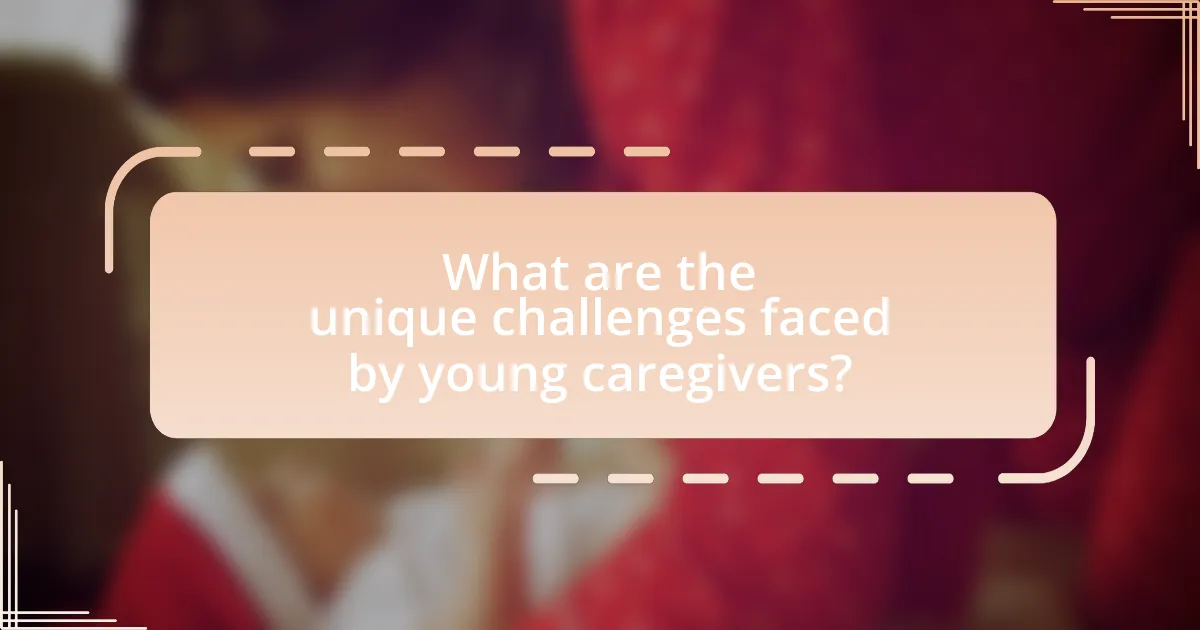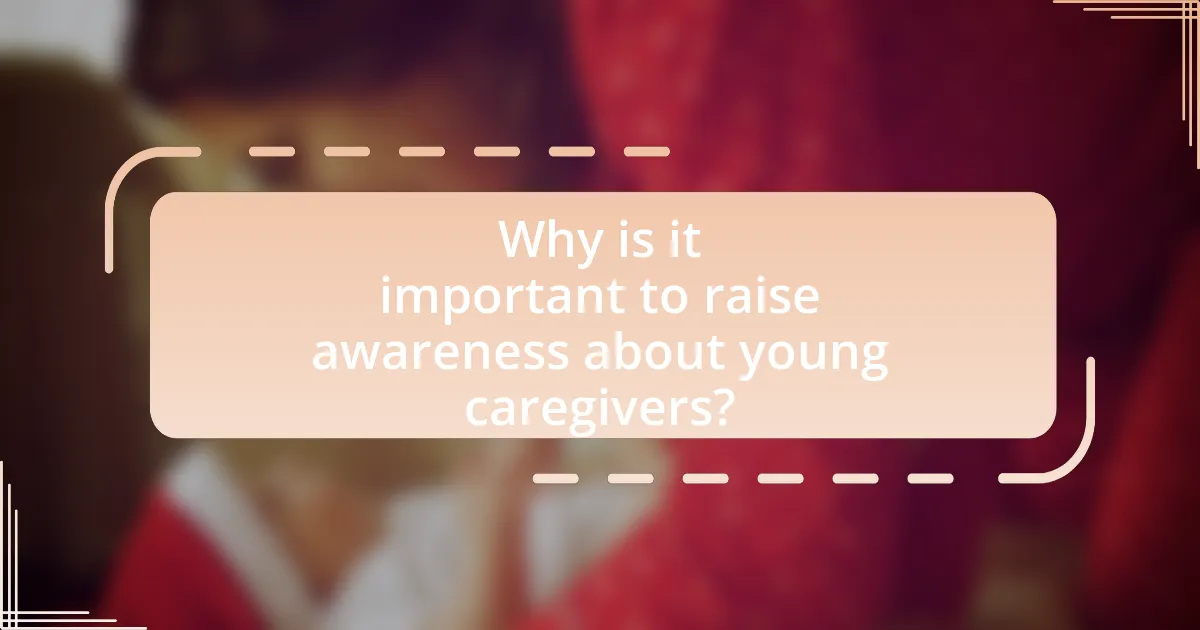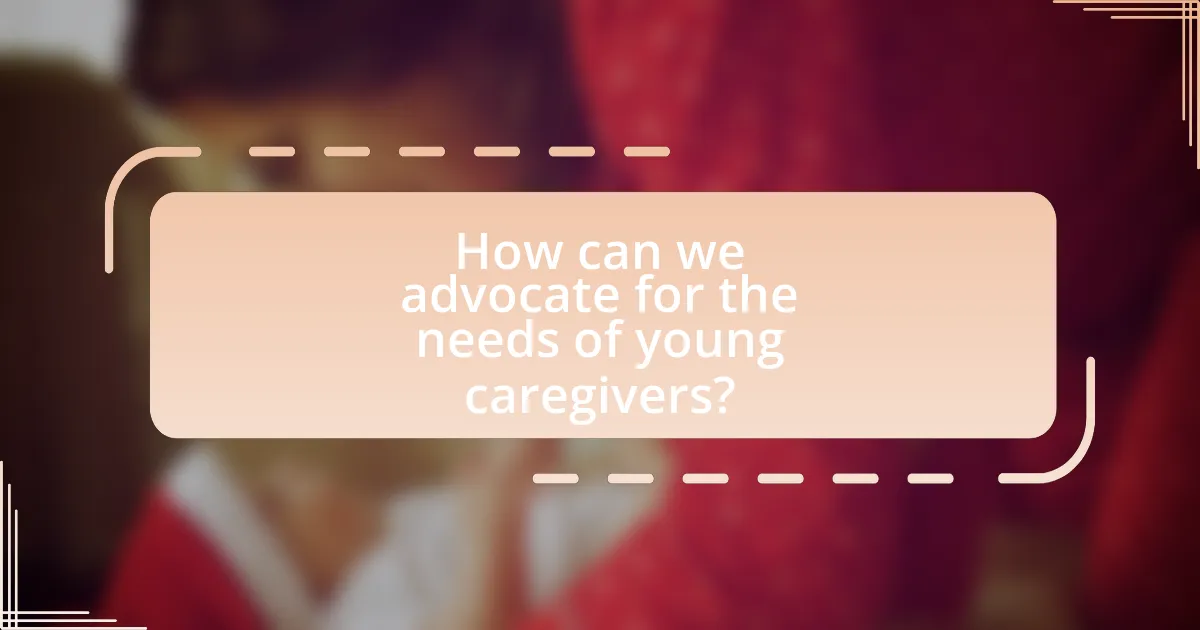The article focuses on the unique challenges faced by young caregivers, who often struggle to balance caregiving responsibilities with their education and social lives. It highlights the emotional and psychological effects of caregiving, including increased stress, anxiety, and depression, as well as the negative impact on their educational and career opportunities. The article also discusses available resources and support systems, the role of community organizations and schools, and the importance of raising awareness about the needs of young caregivers. Additionally, it emphasizes the long-term societal benefits of supporting this demographic and outlines practical steps for individuals and advocacy groups to promote awareness and policy changes.

What are the unique challenges faced by young caregivers?
Young caregivers face unique challenges such as balancing caregiving responsibilities with their own education and social lives. These individuals often experience emotional stress, financial strain, and a lack of support, which can hinder their personal development and mental health. According to a report by the National Alliance for Caregiving, approximately 1.3 million young people in the U.S. provide care for family members, often leading to feelings of isolation and burnout. Additionally, young caregivers may struggle with limited access to resources and information about caregiving, which can exacerbate their difficulties.
How do these challenges impact their daily lives?
Young caregivers face significant challenges that profoundly impact their daily lives by limiting their time for personal development and social interactions. These responsibilities often lead to increased stress and anxiety, as they juggle caregiving tasks with their own educational and social needs. Research indicates that young caregivers frequently experience feelings of isolation, which can hinder their emotional well-being and academic performance. For instance, a study published in the Journal of Adolescent Health found that young caregivers are more likely to report mental health issues compared to their peers, highlighting the detrimental effects of their caregiving roles on their overall quality of life.
What emotional and psychological effects do young caregivers experience?
Young caregivers experience significant emotional and psychological effects, including increased stress, anxiety, and depression. Research indicates that these individuals often face feelings of isolation and role strain due to their caregiving responsibilities, which can lead to a decline in mental health. A study published in the Journal of Adolescent Health found that young caregivers reported higher levels of psychological distress compared to their peers, with 40% experiencing symptoms of depression. Additionally, the demands of caregiving can hinder their social development and educational opportunities, further exacerbating feelings of inadequacy and emotional burden.
How do caregiving responsibilities affect their education and career opportunities?
Caregiving responsibilities significantly hinder education and career opportunities for young caregivers. Research indicates that young caregivers often experience increased absenteeism in school, leading to lower academic performance and higher dropout rates. A study by the National Alliance for Caregiving found that 54% of young caregivers reported that their responsibilities negatively impacted their education, with many sacrificing extracurricular activities and part-time jobs to fulfill caregiving duties. This disruption in education can limit access to higher education and career advancement, as young caregivers may lack the time and resources to pursue further qualifications or job opportunities.
What resources are available to support young caregivers?
Young caregivers can access various resources to support their needs, including educational programs, counseling services, and community support groups. Organizations such as the Young Caregivers Association provide tailored resources, including workshops and peer support networks, specifically designed for young individuals who care for family members. Additionally, the National Alliance for Caregiving offers online resources and toolkits that address the unique challenges faced by young caregivers, emphasizing the importance of mental health and self-care. These resources are validated by studies indicating that young caregivers often experience higher levels of stress and emotional strain, highlighting the necessity for targeted support systems.
How can community organizations assist young caregivers?
Community organizations can assist young caregivers by providing resources, support networks, and educational programs tailored to their unique challenges. These organizations can offer respite care services, allowing young caregivers to take breaks and manage their own well-being. Additionally, they can facilitate peer support groups where young caregivers can share experiences and coping strategies, fostering a sense of community. Educational workshops on caregiving skills and mental health can empower young caregivers with knowledge and tools to navigate their responsibilities effectively. Research indicates that support from community organizations significantly reduces caregiver stress and improves overall mental health outcomes for young caregivers.
What role do schools play in supporting young caregivers?
Schools play a crucial role in supporting young caregivers by providing resources, creating awareness, and fostering a supportive environment. They can implement programs that educate staff and students about the challenges faced by young caregivers, which helps to reduce stigma and promote understanding. For instance, schools can offer counseling services and flexible academic options to accommodate the unique needs of these students, allowing them to balance their caregiving responsibilities with their education. Research indicates that schools that actively engage in supporting young caregivers can improve their academic performance and emotional well-being, as highlighted in studies conducted by the National Alliance for Caregiving and AARP, which emphasize the importance of school-based interventions in enhancing the lives of young caregivers.

Why is it important to raise awareness about young caregivers?
Raising awareness about young caregivers is crucial because it highlights their unique challenges and needs, which are often overlooked. Young caregivers, who are typically under the age of 18, provide essential support to family members with disabilities or chronic illnesses, yet they frequently face emotional, physical, and educational burdens. According to a report by the National Alliance for Caregiving, approximately 1.3 million children in the United States serve as caregivers, often sacrificing their own well-being and academic success. Increased awareness can lead to better support systems, resources, and policies that address their specific circumstances, ultimately improving their quality of life and ensuring they receive the necessary assistance.
How does increased awareness benefit young caregivers and their families?
Increased awareness benefits young caregivers and their families by providing them with essential resources, support networks, and recognition of their unique challenges. This heightened awareness leads to improved access to mental health services, educational opportunities, and financial assistance, which are crucial for managing the demands of caregiving. Research indicates that young caregivers often experience higher levels of stress and mental health issues; therefore, awareness initiatives can facilitate targeted interventions that address these specific needs, ultimately enhancing their well-being and that of their families.
What are the long-term societal benefits of supporting young caregivers?
Supporting young caregivers leads to long-term societal benefits such as improved mental health outcomes, enhanced educational attainment, and increased workforce participation. Research indicates that when young caregivers receive adequate support, they experience lower levels of stress and anxiety, which contributes to better overall mental health. For instance, a study published in the Journal of Adolescent Health found that young caregivers who accessed support services reported significantly lower rates of depression compared to those who did not.
Additionally, providing resources and assistance to young caregivers can facilitate their educational success. According to the National Alliance for Caregiving, young caregivers who receive support are more likely to complete their education, which in turn enhances their employability and economic stability. This educational attainment contributes to a more skilled workforce, ultimately benefiting the economy.
Furthermore, when young caregivers are supported, they are more likely to engage in the workforce, reducing the burden on social services and increasing tax revenues. A report from the AARP Public Policy Institute highlights that supporting caregivers can save the economy billions in healthcare costs by preventing caregiver burnout and associated health issues.
In summary, the long-term societal benefits of supporting young caregivers include improved mental health, higher educational outcomes, and increased workforce participation, all of which contribute to a healthier, more productive society.
How can awareness campaigns effectively reach young caregivers?
Awareness campaigns can effectively reach young caregivers by utilizing digital platforms and social media, which are prevalent among this demographic. Research indicates that 95% of young adults aged 18-29 use social media, making it an ideal channel for targeted messaging. Campaigns should focus on relatable content, peer testimonials, and interactive elements to engage young caregivers. For instance, the “Young Carers Awareness Day” campaign successfully utilized Instagram and TikTok to share stories and resources, resulting in increased visibility and support for young caregivers. This approach not only raises awareness but also fosters a sense of community among young caregivers, encouraging them to seek help and share their experiences.
What strategies can be implemented to promote awareness?
To promote awareness around the needs of young caregivers, targeted educational campaigns can be implemented. These campaigns should focus on disseminating information through social media platforms, community workshops, and partnerships with schools and healthcare organizations. Research indicates that social media campaigns can reach a wide audience quickly; for instance, a study by the Pew Research Center found that 69% of adults use social media, making it an effective tool for awareness initiatives. Additionally, community workshops can provide direct engagement, allowing young caregivers to share their experiences and needs, thereby fostering a supportive environment. Collaborating with schools can integrate awareness into educational curricula, ensuring that young caregivers are recognized and supported within their communities.
How can social media be utilized to spread awareness about young caregivers?
Social media can be utilized to spread awareness about young caregivers by creating targeted campaigns that highlight their challenges and needs. Platforms like Facebook, Instagram, and Twitter allow organizations to share personal stories, statistics, and resources that resonate with a broad audience. For instance, a campaign could feature testimonials from young caregivers, illustrating their daily struggles and the emotional toll of caregiving, which can foster empathy and understanding among viewers. Additionally, using hashtags such as #YoungCaregivers or #CaregivingAwareness can help to aggregate content and increase visibility. Research indicates that social media campaigns can significantly enhance public awareness and engagement; for example, a study published in the Journal of Medical Internet Research found that social media interventions can effectively raise awareness about health-related issues, demonstrating the potential impact of similar strategies for young caregivers.
What role do public events play in raising awareness?
Public events play a crucial role in raising awareness by providing a platform for education, engagement, and community involvement. These events facilitate direct interaction between caregivers, stakeholders, and the public, allowing for the sharing of personal stories and experiences that highlight the challenges faced by young caregivers. For instance, a study by the National Alliance for Caregiving found that public awareness campaigns significantly increased understanding of caregiver issues, leading to greater community support and policy advocacy. By mobilizing resources and fostering dialogue, public events effectively amplify the voices of young caregivers and promote necessary changes in societal perceptions and policies.

How can we advocate for the needs of young caregivers?
To advocate for the needs of young caregivers, it is essential to raise awareness about their unique challenges and provide targeted support. This can be achieved through community outreach programs that educate the public on the responsibilities and emotional burdens faced by young caregivers, as highlighted by the 2020 report from the National Alliance for Caregiving, which states that nearly 1 in 5 caregivers in the U.S. are under the age of 18. Additionally, creating support networks and resources, such as counseling services and peer support groups, can help young caregivers manage their responsibilities while also addressing their mental health needs. Engaging policymakers to implement legislation that recognizes and supports young caregivers is also crucial, as evidenced by the introduction of the Young Caregivers Act in various states, which aims to provide resources and protections for this demographic.
What policies can be implemented to support young caregivers?
Policies that can be implemented to support young caregivers include providing financial assistance, offering flexible educational options, and ensuring access to mental health services. Financial assistance programs can alleviate the economic burden on young caregivers, as studies show that caregiving often leads to increased financial strain. Flexible educational options, such as online courses or adjusted school schedules, can help young caregivers balance their responsibilities while continuing their education. Access to mental health services is crucial, as research indicates that young caregivers experience higher levels of stress and anxiety compared to their peers. Implementing these policies can significantly improve the well-being and support systems for young caregivers.
How can advocacy groups influence policy changes for young caregivers?
Advocacy groups can influence policy changes for young caregivers by mobilizing public support, conducting research, and engaging in direct lobbying efforts. These organizations raise awareness about the unique challenges faced by young caregivers, such as balancing education and caregiving responsibilities, which can lead to increased public and legislative attention. For instance, a report by the National Alliance for Caregiving highlights that young caregivers often experience higher levels of stress and mental health issues, prompting advocacy groups to push for policies that provide resources and support systems. By presenting data and personal stories, these groups can effectively persuade policymakers to implement changes that address the needs of young caregivers, such as access to respite care and educational accommodations.
What are the best practices for engaging with policymakers on this issue?
The best practices for engaging with policymakers on building awareness around the needs of young caregivers include establishing clear communication, providing data-driven evidence, and fostering relationships. Clear communication ensures that policymakers understand the specific challenges faced by young caregivers, such as balancing education and caregiving responsibilities. Providing data-driven evidence, such as statistics from the National Alliance for Caregiving, which reported that 1 in 5 caregivers in the U.S. is under 18, strengthens the argument for policy changes. Fostering relationships through regular meetings and collaborative initiatives allows for ongoing dialogue and trust-building, which can lead to more effective advocacy efforts.
What practical steps can individuals take to support young caregivers?
Individuals can support young caregivers by providing emotional support, practical assistance, and resources tailored to their needs. Emotional support can be offered through active listening and validating their experiences, which helps reduce feelings of isolation. Practical assistance may include helping with caregiving tasks, such as running errands or providing respite care, allowing young caregivers to take necessary breaks. Additionally, connecting them with resources like support groups, counseling services, and educational materials can empower young caregivers with knowledge and community support. Research indicates that young caregivers often face significant stress, and targeted support can improve their well-being and caregiving effectiveness.
How can friends and family provide meaningful support to young caregivers?
Friends and family can provide meaningful support to young caregivers by offering practical assistance, emotional encouragement, and respite care. Practical assistance includes helping with daily tasks such as meal preparation, transportation, or household chores, which can alleviate the caregiver’s workload. Emotional encouragement involves actively listening, validating their feelings, and providing reassurance, which can help reduce feelings of isolation and stress. Respite care, where friends or family take over caregiving duties for a short period, allows young caregivers to recharge and maintain their own well-being. Research indicates that social support significantly reduces caregiver burden and improves mental health outcomes, highlighting the importance of a strong support network for young caregivers.
What are some effective ways to create a supportive community for young caregivers?
To create a supportive community for young caregivers, organizations can implement peer support groups that facilitate shared experiences and emotional support. Research indicates that peer support significantly reduces feelings of isolation among caregivers, enhancing their mental well-being. Additionally, providing access to educational resources and training programs equips young caregivers with essential skills and knowledge, which has been shown to improve their confidence and caregiving abilities. Furthermore, community outreach initiatives that raise awareness about the challenges faced by young caregivers can foster understanding and encourage community involvement, leading to increased support networks.